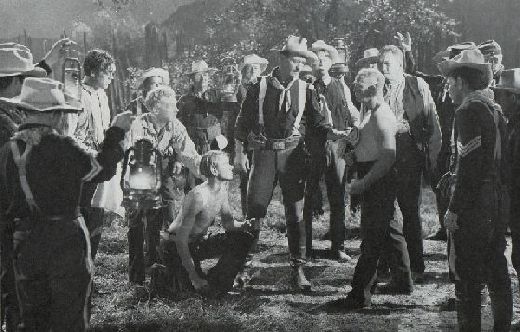Rio Grande (1950) 
“THE BREATHTAKING SAGA OF THE UNITED STATES CAVALRY!”

Director: John Ford
Cast: John Wayne, Maureen O’Hara, Ben Johnson
Synopsis: Lieutenant Colonel Kirby Yorke heads a cavalry post on the Texas side of the Rio Grande, defending settlers against Apaches launching raids from the Mexican side of the river. When Yorke’s 16-year-old son, Jeff – who he has not seen since he was a baby – shows up at the post as one of the new recruits, he treats him more harshly than the others.
Apparently, the only reason Rio Grande came to be made is because its director, John Ford, wanted to make The Quiet Man, and the only way that Republic boss Herbert Yates would let him make that film — which he believed would bomb at the box office — was if he first produced a sure-fire box office hit. It’s a bit like being made to do your homework before you can go out to play, but in this case, instead of rushing the first task so that he could move on to the second, Ford took as much care with Rio Grande as he did with The Quiet Man. It’s not as good as the later movie, which once again united John Wayne and Maureen O’Hara, as well as Victor McLaglen, but it’s still a thoughtful reflection upon what Ford and writer James Kevin McGuinness considered to be the higher ideals of the United States horse soldiers.
The movie opens with Lt. Col Kirby Yorke (John Wayne) returning from a futile mission to hunt down marauding Apaches who launch attacks on whites from the Mexican side of the Rio Grande, territory upon which Yorke and his men are prohibited from riding. And straight away, Ford bestows an air of rugged nobility upon these men, and on Yorke in particular, whom later events show to be a thoughtful and reserved military man. A bad day gets worse for Yorke when he discovers that his son, Jefferson (Claude Jarman Jr.), who recently flunked his exams at West Point, and from whom Yorke has been estranged for fifteen years, is among the latest batch of new recruits. Yorke wastes no time in making it clear to his son that he will receive no favours because of who he is, and Jefferson is equally quick to assure Yorke that he expects none.
Later, after Jefferson has proved his toughness and independence during a fight with another soldier, his mother, Kathleen (Maureen O’Hara) — who is still Yorke’s wife — arrives on camp determined to pay the money necessary to extricate her son from his contract with the army. Honestly, it’s bad enough having your dad for company commander without also having the huge embarrassment of having your mum — who isn’t exactly the ugliest thing to ever wear skirts — also turn up hell-bent on protecting her precious son from all those nasty Indians. The fact that young Jefferson receives no kind of ribbing whatsoever from his mates is quite frankly unbelievable, but Ford and McGuinness clearly felt it was an aspect of the story not worth exploring.
There’s this kind of awkward impasse between the three Yorkes which slows the movie to the sedatest of paces as the plot goes nowhere for the next half hour or so, interrupted only by a spectacular roman-style horse riding display by Jarman, Ben Johnson and Harry Carey Jr. (without the aid of stunt doubles) in which they ride at speed with one foot on the backs of each of two horses. It’s a breath-taking display which establishes the credentials of all three rookies as fearless cavalry men and thus shows the futility of Kathleen’s attempts to talk her son into returning home with her. This lull finally comes to an end when Yorke once more takes his men off in pursuit of the Apaches following an attack on the camp, and when it comes to light that young Trooper Travis Tyree (Johnson) is wanted for manslaughter.
Rio Grande is much more introspective than your typical Western, with a large amount of time given over to the domestic troubles of the fragmented Yorke family and the way in which the male members find comfort in the rituals and order of the surrogate family provided by the cavalry. In fact, that show of bravado horsemanship I mentioned earlier feels as if it has been inserted simply because Ford knew the movie was light on action and needed something to prevent it from dragging. He wasn’t wrong, and neither was he entirely successful in disguising the measured pace of the storyline. He also wasn’t helped by the decision to add The Sons of the Pioneers, who slow things even further with the occasional song.
The movie cries out for colour, but despite the budgetary requirements of black and white cinematography, it looks superb all the time, and particularly when Ford moves the action away from the studio and treats us to the stunning unspoiled backdrop of Monument Valley. A coincidental bonus about the monochrome picture is that it subdues the natural fieriness of O’Hara’s features which is more compatible with the nature of her role while, under Ford’s direction, Wayne unearths a versatility that lesser directors were never able to tap into. The ending’s a bit of an anti-climax, with a bunch of drunken Indians failing to provide the grandstanding finale we might be entitled to expect after all that measured build up, but Rio Grande still deserves its position as one part of Ford’s Cavalry Trilogy.
(Reviewed 30th October 2013)
httpv://www.youtube.com/watch?v=oo7CHY544HY
